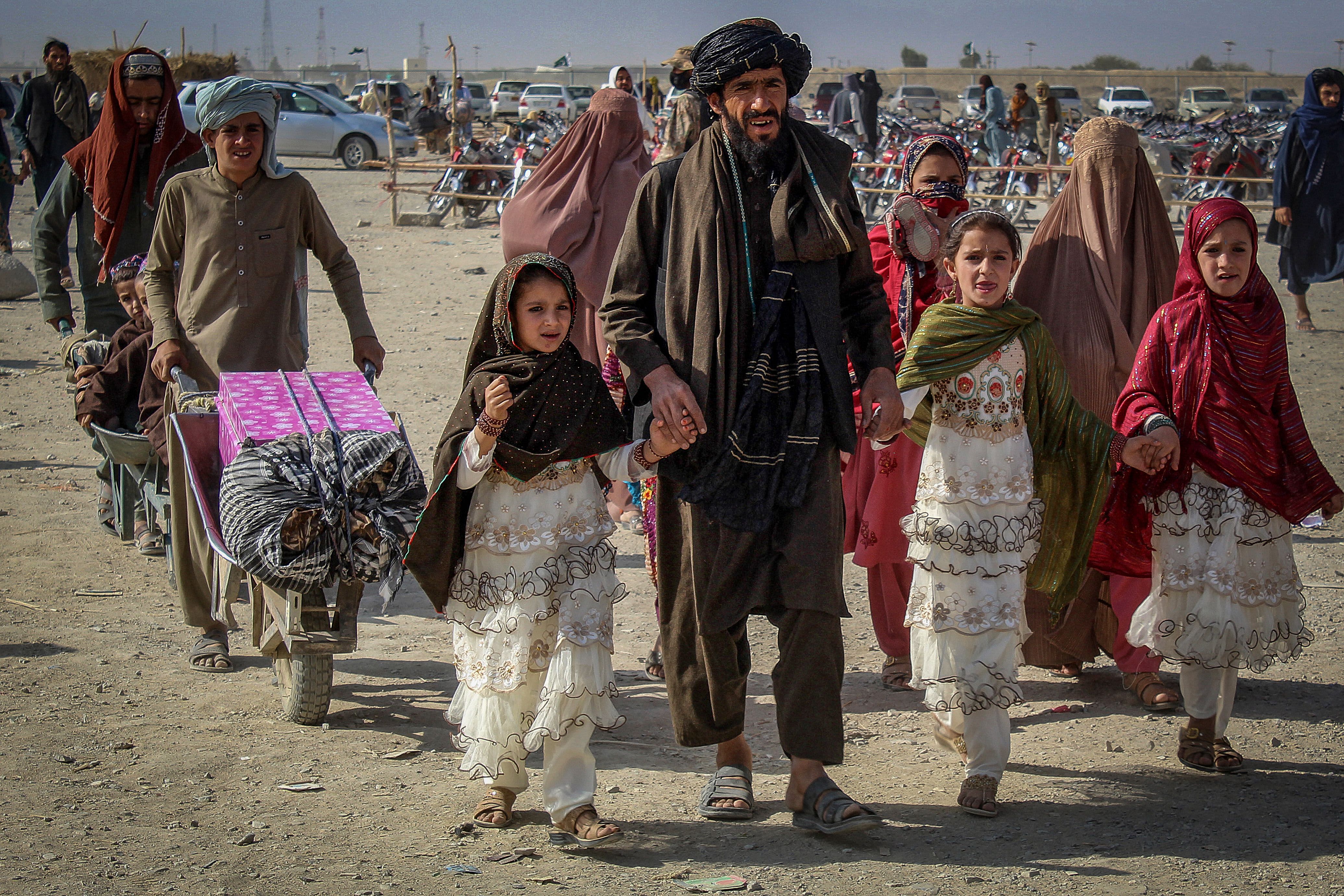
Pakistan was one of the first countries to welcome the Taliban's return to power in Afghanistan last month, following the collapse of the U.S.-backed civilian government. Now, Islamabad has to worry about some of the consequences of the Taliban's success next door, former diplomats and political analysts said.
"It may not be as easy for Pakistan as its leaders may have thought," Husain Haqqani, who was Pakistan's ambassador to the U.S. between 2008 and 2011, told CNBC in a recent interview.
Prime Minister Imran Khan reportedly said that Afghans had "broken the shackles of slavery." Foreign Minister Shah Mahmood Qureshi and Pakistan's national security advisor Moeed Yusuf publicly urged the international community to engage with Afghanistan — which, in essence, now means the Taliban.
Pakistan, despite being an U.S. ally, had long been accused of covertly aiding the Taliban during their 20-year insurgency in Afghanistan — a charge that Islamabad denies.
What are the issues?
The main issue that Haqqani and others point to is the security risk posed by the domestic terror group Tehrik-e-Taliban Pakistan, also known as the Pakistani Taliban — the group is separate from the Afghan Taliban. Last week, the TTP reportedly claimed responsibility for a suicide attack in Pakistan that killed at least three people and left 20 wounded.
The group will "definitely be encouraged by the success of their brethren in Afghanistan," Haqqani said. "The Pakistani Taliban would like to replicate what happened in Afghanistan in at least the Pashtun areas of Pakistan — so, that's one problem."
It would be very difficult for Pakistan not to recognize the Taliban.Husain Haqqaniformer Pakistan ambassador to the U.S.
Pashtuns are an ethnic group native to Afghanistan and northwest Pakistan. The contested colonial-era Durand Line, which forms the international land border between the countries, separates Pakistani Pashtun-dominated territories from Afghanistan. The latter claims those territories as part of a traditional Pashtun homeland.
According to the Council on Foreign Relations, Islamabad believes that the Afghan Taliban's ideology emphasizes Islam over Pashtun identity. Both the Afghan Taliban and the TTP are predominantly Pashtun.
"Given the Afghan Taliban's links with the Pakistani Taliban — both operational and ideological — Pakistan really has to worry about the risks a resurgent TTP poses to Pakistan," Madiha Afzal, a David M. Rubenstein fellow in the foreign policy program at Brookings Institution, told CNBC.
"It has already seen some of those risks materialize with the release of TTP prisoners from jails in Afghanistan in recent weeks as well as an uptick in attacks against Pakistani security forces," Afzal said.
The Afghan Taliban have yet to denounce the TTP or recognize the Durand Line as the formal border between Afghanistan and Pakistan.
International recognition
The Taliban have held diplomatic talks with a number of countries in their attempt for international recognition — including Pakistan's biggest rival India.
The militant group has sought to distance itself from its past brutalities as it tries to gain that global recognition, which could give them access to international aid that Afghanistan desperately needs. But many, including Haqqani, say they are not convinced by the Taliban's assurances.
"If the Taliban are unable to get international recognition and there are sanctions against them, there will be a fallout on Pakistan," ambassador Haqqani, who is also director for South and Central Asia at Hudson Institute, said.
He explained that Pakistan would be forced to implement any international sanctions placed on Afghanistan and it would not be an easy task given the porousness of the international border. There is also "widespread sympathy for the Taliban in Pakistan," Haqqani said.
Pakistan would also have to potentially contend with a large inflow of refugees if the situation in Afghanistan destabilizes due to future fighting among the Taliban and other insurgent groups, he added.
Brookings' Afzal added that Pakistan's perceived closeness with the Taliban would also pose significant problems for its global reputation, after the country spent years attempting to shed an image associated with terrorism. "That relationship with the Taliban in particular could strain Pakistan's already troubled relationship with the U.S.," she said.
What happens next?
The Taliban last week formed an all-male interim government.
Political risk consultancy Eurasia Group said the acting government "is not the ideal outcome for Pakistan, which has been working to cultivate non-Pashtun support" in Afghanistan.
Pakistan's foreign ministry consulted with leaders of the former U.S.-backed Northern Alliance about the possibility of their joining a Taliban-led government, according to Eurasia Group. "But the Taliban have insisted that anyone who collaborated with the 'occupation regime' cannot hold a senior position."
The Northern Alliance comprised of a loose coalition of Afghan warlords who fought the Taliban in the late-1990s.
Islamabad has yet to formally recognize the Taliban as rulers of Afghanistan. Haqqani told CNBC that the delay is a political strategy where Pakistan is hoping that other countries would recognize a Taliban-led Afghan government first.
"It would be very difficult for Pakistan not to recognize the Taliban," he said, adding that Islamabad could end up with a "pyrrhic victory."
"The Americans are out, and the government that had been created through international support is gone. So, will Pakistan really be able to have influence in Afghanistan of the kind that it wanted, without Afghanistan being a source of destabilization inside Pakistan?" Haqqani added.
World - Latest - Google News
September 14, 2021 at 08:28AM
https://ift.tt/3EdCFDi
Pakistan should worry about consequences of Taliban's success in Afghanistan, former ambassador says - CNBC
World - Latest - Google News
https://ift.tt/2SeTG7d
Bagikan Berita Ini














0 Response to "Pakistan should worry about consequences of Taliban's success in Afghanistan, former ambassador says - CNBC"
Post a Comment